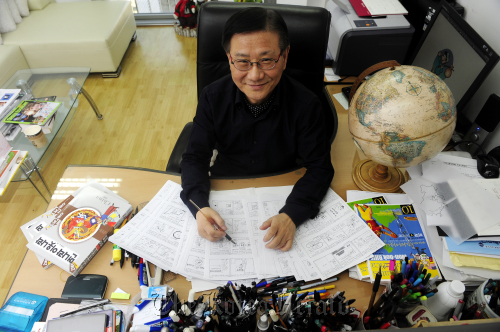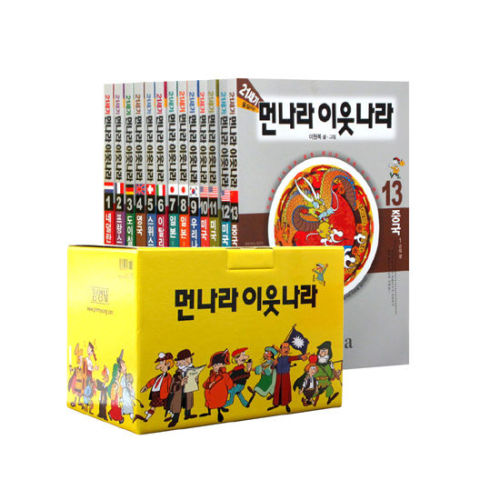Popular cartoonist and author Rhie talks about writing overviews of world history
According to ancient Greek sage Thales, the hardest thing is to know yourself and the easiest to advise others. Perhaps it is a certain cartoonist of the 21st century who best follows the drift of what the ancient sage tried to impart.
Rhie Won-bok, a famous cartoonist and author, has a world view resembling that of Thales. The writer of the series“The Foreign and Neighbor Countries” ― the 23-year-old steady-seller that covers a comprehensive history of six European countries as well as Japan, the United States, China, and Korea ― says that writing about Korea was his toughest task. But he found it relatively easy to write about other countries.
According to ancient Greek sage Thales, the hardest thing is to know yourself and the easiest to advise others. Perhaps it is a certain cartoonist of the 21st century who best follows the drift of what the ancient sage tried to impart.
Rhie Won-bok, a famous cartoonist and author, has a world view resembling that of Thales. The writer of the series“The Foreign and Neighbor Countries” ― the 23-year-old steady-seller that covers a comprehensive history of six European countries as well as Japan, the United States, China, and Korea ― says that writing about Korea was his toughest task. But he found it relatively easy to write about other countries.

Each part of his sweeping series starts by tackling what he calls the ‘Achilles’ tendon’ of a country, then moves to the unraveling of a country’s deeply-rooted ideologies and its connections to modern society. But don’t get it wrong, his books are not dull compilations of historical facts; they are complimented with the genuine, soft touches of his illustrated cartoons.
He says the logic behind his comprehensive interpretation of various countries is simple. He takes their history as a puzzle ― with different interconnected pieces.
“How are we to divide each and every sector of world history into every single national history?” he said in a recent interview with The Korea Herald. “All history is linked by one context.”

Rhie noted that the 18th century London Treaty and the American Civil War were closely related. According to his writing, Napoleon’s nationalism in the 18th century influenced the Americans and led to the Civil War.
Watching the forest rather than one tree is essential in the world view he tries to portray in his books. However, some critics point out that his excessively broad interpretation of historical events could lead to hasty generalizations.
“I understand the criticism that my view-point can be faulty, but if I pursued ‘perfection,’ then I would not be able to write anything at all,” he explained. “What I write about is a certain tendency of a country, not a definition of a country itself.”
When he writes about a country, he starts with one talking point.
“For France, streaming up from Descartes, there is civil democracy, individualism and humanism. As for England, the key point is a dual power structure. Dig down further and you will wonder how this was possible, then we find out that it was so because England is an island just like Japan.”
“I try to find a code from which to discover historical connections one by one, and that becomes the story.”
Had his broad world view been overslaught yet?
Yes, in his U.S. series, he touched issues about Jews. They were depicted to hold various positions everywhere in the country and pose a tough rivalry against Korean Americans. A strong complaint from the United States made him immediately take out the entire Jewish reference from the English version of his U.S. series.
“That exactly shows the code of the Americans ― they only like to hear what they like to hear. I’m not saying that’s good or bad, but it’s their inherent code. I learned from the experience that even ‘talking about’ Jewish people is sort of a taboo there.”
Ironically, the second complaint was related to the book on Korea. He was criticized as being a pro-Japanese writer, though he said he just tried to describe the Japanese colonial period from a more ‘objective’ point of view. He dismissed the criticism and was rather pleased with such response to his book.
“I tried to keep my balance, so I didn’t want to lean toward nationalism. The accusations of me being a pro-Japanese are a reflection that I pointed out the facts objectively,” he said.
“It is not too much to say that I wrote about other countries to eventually write objectively about Korea.
“I try my best not to be stereotypical about a country. I simply don’t learn or research about it before I go and watch it. Reading and researching will likely cement my own stereotypes about that country, so I just go and experience it to finalize my thoughts about the facts.”
He compared the steady popularity of his books to the recent best sellers of Jang Ha-joon’s books.
“People have been talking about only the bright side of capitalism. But since Jang has exposed the dark side, people can get the whole picture of capitalism. Likewise, everything should be complementary. So my books about foreign countries written with such belief should give a more objectified view.”
He thinks that it is important for countries to understand and admit their Achilles’ tendons, rather than try to deny them: “For Korea, the Japanese colonial rule is part of the history it wants to erase from memory. For Germany, it’s the Nazi dictatorship and Holocaust, For the French, it’s the Algeria War; For the United States it’s the Vietnam war, the first war they have lost.”
Rhie cited the emergence of a ‘global era’ and the collapse of ‘nationalism’ as two of the key events in modern history,
“The world is shedding racial distinction and borders. Where you reside is your hometown. Nationality does not hold much meaning anymore."
“We are living in a global village, and it is important to keep up with its trend.”
Rhie suggested that the younger generation should travel abroad to widen their scope of thought.
“It will be a great asset to Korea if international students came to Korea and go back to their countries as supporters of Korea,” he added.
By Hwang Jurie (jurie777@heraldcorp.com)








![[Today’s K-pop] BTS pop-up event to come to Seoul](http://res.heraldm.com/phpwas/restmb_idxmake.php?idx=644&simg=/content/image/2024/04/17/20240417050734_0.jpg&u=)
![[Graphic News] More Koreans say they plan long-distance trips this year](http://res.heraldm.com/phpwas/restmb_idxmake.php?idx=644&simg=/content/image/2024/04/17/20240417050828_0.gif&u=)






![[KH Explains] Hyundai's full hybrid edge to pay off amid slow transition to pure EVs](http://res.heraldm.com/phpwas/restmb_idxmake.php?idx=652&simg=/content/image/2024/04/18/20240418050645_0.jpg&u=20240419100350)

